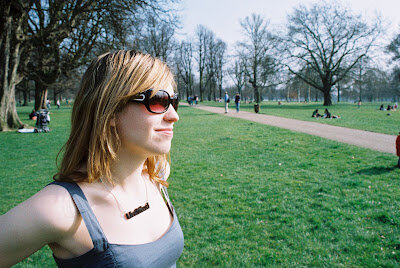This is a piece I wrote for my old blog Green Ink, about 10 years ago. As today would have been Margaret Scott’s 85th birthday, I thought I’d republish it here.
When I was sixteen years old, my school held a kind of activity day in late October in the lead up to the end of the year and the Christmas holidays, when attention levels were drooping and we were in need of some fun, with the HSC (Oz equivalent of GCSE) exams on the horizon for most of us. The day was filled with workshops in various recreational activities designed around the theme of "Let Your Lives Speak", as per the Quaker ethos.
I signed up for the creative writing workshop which was to be run by Margaret Scott. Margaret was a poet, novelist and well-known intellectual, both throughout the state and on a national scale, and at this time she was a regular on Good News Week. Students and teachers alike were abuzz with excitement about her coming to the school - I, on the other hand, almost exclusively inhabited the world of nineteenth-century literature at that time (oh, how cool I was!) and didn't really know who she was. I was just interested in doing a creative writing workshop!
She gave us a topic to write on and we were given fifteen minutes to write a piece, and then we went around the room where everyone read theirs aloud. I was surrounded by students who I think quite fancied themselves as the top dogs of the arts at the school, and most of them eagerly volunteered to go first, with Margaret offering some brief comments, but nothing along the lines of "oh my goodness, that is amazing for one so young", which I think they were expecting! (I'm sure you all went to school with people like that!)
It came to my turn and I read my piece. When I finished, no one said anything.
Margaret started saying something, but then she trailed off and looked directly at me. Her eyes were so perceptive I felt like she could see right through me.
"Would you read that again?" she asked.
Being an insecure teenager with no confidence in my abilities, my immediate thought was "why? What's wrong with it?!" I felt very stupid! But I seem to recall the rest of the people in the room looking at me with a mixture of awe and envy. So, I read it again. Of the whole group, I was the only one asked to read again. And then the piece was discussed for almost the rest of the session, until one of the teachers supervising remembered that there were a few more people to get through! I can't even remember what it was about, but I seem to recall everyone's comments on the hidden symbolism in my piece making me sound far more in command of the craft than I actually was.
I never told anyone about it at the time because as I say, my first reaction was to be embarrassed, but I look back on that episode now with pride. Sometimes in my low moments I think back to it, and think that if a piece I wrote made a fine writer and scholar such as Margaret Scott have to think twice, then maybe I do have something.
It's a memory I treasure. Thank you, Margaret.
She passed away in 2005. It was only in the last few years of her life that I got to know her through her work, not just this memory. I love her poems, particularly the housework ones (which I'm trying to find a copy of) and I recommend trying to find her novel Family Album - if you're in Australia you should be able to get a copy from most libraries. It's a lovely book.
Do you have a moment like this that you look back on, to spur you forward?
~ ~ ~ ~
CASTAWAY
Sometimes a neighbour's look, a post-card, a telephone call
will carry you up the shore of another life
and leave you gaping amazed at sudden jungle
a world away from the dolorous desk
the spruce back-yard, the brick-and-tile in Rosebud.
This glimmering shade's cacophonous with
unfamiliar names of long-dead pets and teachers,
side-streets in distant cities and faithless lovers.
The canopy's alive with flitting shapes unknown
beyond the confines of this island.
Here is the castaway's camp, his palisade,
contrivances he's fashioned year by year,
stores he saved from the wreck of his old ship
before it sank from sight beyond the reef.
Fragments of once-proud sails now patch his roof.
A saw, a pannikin hang by the bed
where every day he wakes alone at dawn
to a view of mountains. Those peaks rise
over the trees in a blue scrawl whose message
you seem to have read from a different angle
on the wall of sky to the east of your own island.
© Margaret Scott




